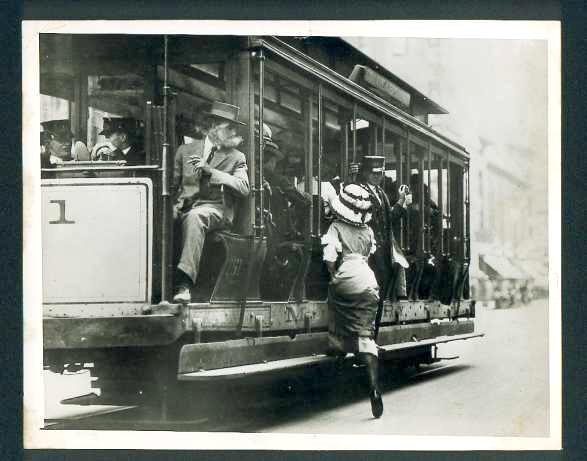Norberto, who at first enthusiastically accepted the stops the streetcars made in Botafogo, is now their greatest opponent. Do you want to know why? I will tell you:
One night, at the Expo, the poor young man met the most beautiful and fascinating woman his eyes had ever beheld, and this woman—oh, joy!…oh, fortune!…—this woman smiled gently at him, and with a sweet look she invited him to accompany her.
Norberto did not wait for the invitation to be repeated: he accompanied her.
She stepped into the Avenue of the Pavilions, made her way to the entrance, and went out as if she were going to take the streetcar; he followed her, but there were so many people leaving that he lost sight of her.
Desperate, he ran for the streetcars, some six or seven being ready to depart, and he climbed onto all the side-rails, searching in vain, with eyes peeled for the unknown beauty.
“She probably went by car,” thought Norberto, and so he started home.
He went to bed but could not get to sleep: the image of that woman would not leave his mind.
Dawn was breaking when he managed to drift off, only to dream of her, and the following day not a minute passed without his thinking of that happy encounter.
Thereafter he was a martyr. The wretched lover began to lose weight, quite surprised that a simple look and a simple smile should have had such an effect on him.
A few days passed and that extraordinary love only grew, when one afternoon—oh, what fortune!…oh, what joy!…—, one afternoon, passing through Catete, Norberto saw, on a Laranjeiras streetcar, the woman from the Expo. She did not see him.
The poor devil signaled the driver to pull over, but unfortunately the stop was quite far away and the streetcar did not pull over. And not to have, there at hand, a tilbury, a calash, an automobile!…
Norberto took off running after the streetcar, but he only managed to exhaust himself. What human legs could possibly keep up with electricity?
This new encounter ignited a livelier flame in Norberto’s chest, and countless were the steps he took from Largo do Machado Águas Férreas in hopes of seeing his beloved and speaking to her.
Eight days later, Norberto was riding the streetcar, for the hundredth time, to Laranjeiras, when, in the vicinity of the Pasteur Institute, he saw passing by—oh, joy!…oh fortune!—he saw passing by on the street the woman who had so agitated him.
“Stop! Stop!…” he cried to the driver.
“I can’t pull over here; we’re going to the next stop!”
Norberto tried to get off, but the streetcar traveled at such a speed that he did not dare.
Arriving at the stop, he hurled himself into the street and took off running for the place where he had seen the woman, but, where was she? She had disappeared!
And that is why Norberto is now the greatest opponent of the stops.
***
Read Artur Azevedo’s “The Stops” in the original Portuguese here.
***
Artur Azevedo (Brazil, 1855-1908) was a writer of plays, short stories, and poetry. He is best known for popularizing the comedy of manners in Brazil. One of the first members of the Academia Brasileira de Letras (Brazilian Academy of Letters), known as “imortais” or immortals, Azevedo was a crucial figure in the development of modern Brazilian literature. Besides founding numerous literary journals, he promoted the abolition of slavery in essays and plays and pushed for the construction of Rio de Janeiro’s Teatro Municipal. Through his translations of French works and certain stylistic influences in his own writings, he introduced European ideas into the literature of his day. His plays are still widely performed in Brazil today.
Amanda Sarasien is a writer and literary translator (Portuguese/French/Spanish to English). Her stories have appeared in Cigale and Emrys Journal, while her translations were included or are forthcoming in Aldus, a Journal of Translation and MAYDAY Magazine. She contributes book and film reviews regularly at the sites Reading in Translation and The Mookse and the Gripes and recently completed a story collection. She can be found online at amandasarasien.com or on Twitter @amandasarasien.
***
Image of late 19th-century open car via Brooklyn Historic Railway Association

